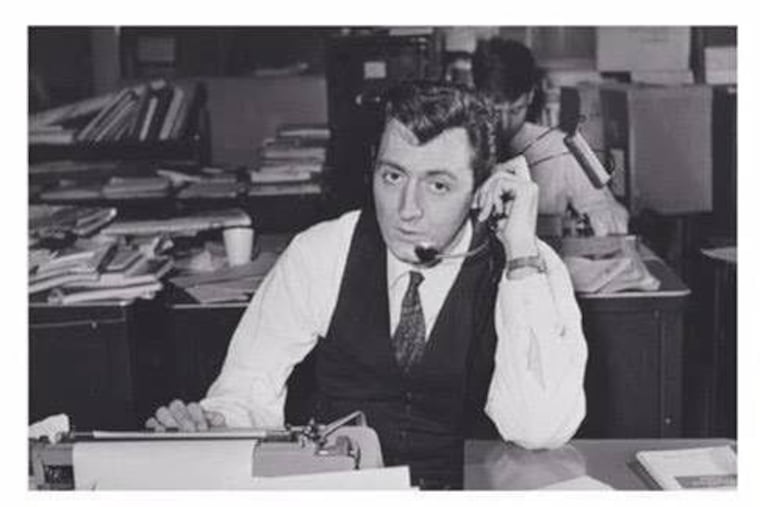Joseph R. Daughen, prolific investigative reporter and author, dies at 85
He was one of the best investigative reporters in the history of Philadelphia newspapers, and the author of three influential books on life and people in the city.

Joseph R. Daughen, 85, of Phoenixville, one of the best investigative reporters in the history of Philadelphia newspapers, and the author of three influential books on life and people in the city, died Thursday, Feb. 18, of complications from COVID-19 at Brandywine Hall in West Chester.
Mr. Daughen’s wife, Joan, 84, had died just four days earlier of COVID-19 at the same health-care facility.
A South Philadelphia kid who wanted to play professional baseball until he hurt his shoulder after high school, Mr. Daughen turned to newspapers only after he unexpectedly got into Temple University. He graduated in 1956 with a degree in journalism, and embarked immediately on a 50-year reporting and writing career that left him embraced by readers, revered among peers, and respected by sources and subjects.
He bookended his work life with two stints at the Daily News, with 19 years in between at the Evening Bulletin, before retiring in 2005.
A two-time finalist for the Pulitzer Prize, Mr. Daughen wrote about city and state politics, crime, corruption, and race. He covered five presidential campaigns, the Vietnam War, the Philadelphia mob, Watergate, and the assassination of the Rev. Dr. Martin Luther King Jr. — among countless other stories.
And he did it with such quiet zeal and professionalism that people recall that part of him as much as his achievements.
“He was the consummate pro,” said Don Russell, a former Daily News writer and editor who sat near Mr. Daughen in the newsroom and spent a decade having lunches with him around town. “He was a gentle soul with a hard nose for news. He had a good sense of right and wrong, and that is what drove him always.”
Born on June 12, 1935, Mr. Daughen graduated from South Philadelphia High School at 16. He was working as a laborer, according to his daughter, Joan Patrice, when a friend wanted company to apply in person for admission to Temple. So Mr. Daughen applied to the university, too. He got in, and his mother made him go.
He developed his talent to write in journalism classes and, though he flirted with being a sportscaster, went right from graduation to the Daily News. At first, he covered cops on the overnight shift, and, with other duties, stayed at the Daily News from 1956-63.
He left for the Bulletin, and flourished by collaborating with other writers on consequential investigative pieces, and authoring other articles. At the Bulletin, former Daily News colleague Paul Davies said, Mr. Daughen specialized in stories about “crooked judges, dirty cops, and crappy pols.” He worked in the Washington bureau for two years, and traveled the South covering the civil rights movement in the 1960s.
He spent six months in 1964 researching a special section about the lives of Black Philadelphians that made him a finalist for the 1966 Pulitzer Prize. He was also a finalist in 1974. “He wanted to right wrongs,” said former Daily News writer Kitty Caparella.
Mr. Daughen also teamed with Bulletin business writer Peter Binzen in the 1970s to produce two influential books. In 1971, they published The Wreck of the Penn Central, an investigation of the Pennsylvania Railroad in what was then the largest bankruptcy in U.S. history.
In 1977, they published The Cop Who Would Be King, an investigative look at the rise and fall of then-Philadelphia mayor Frank Rizzo. Daughen said in 1997 that it was less popular than their first book. But it prompted an angry response from the controversial Rizzo that Mr. Daughen thoroughly enjoyed, his family said.
Craig McCoy, an Inquirer reporter and editor, called those books “pioneering urban journalism,” and described Mr. Daughen’s writing as “utterly without bias and as clear as a pane of glass.”
When the Bulletin closed in 1982, Mr. Daughen returned to the Daily News and spent the next 23 years polishing his already-shiny resume.
After leaving the paper, Mr. Daughen in 2008 published Fearless: The Richard A. Sprague Story, a biography of the well-known Philadelphia attorney who was also his close friend.
Throughout his career, Mr. Daughen, tall and lanky, wore a suit to the office. He was known for turning his back to anyone nearby, hunching over his phone, and quietly talking — some said whispering — with his sources. “I never once knew who he was talking to,” Russell said.
He had a wry, low-key sense of humor, liked to talk baseball at lunch, and tried to catch the 6 p.m. train back home to Glenside as often as possible. He gave encouragement and advice freely to colleagues.
He met his wife at Temple, and they married in 1961. He had a weekly standing lunch date with his daughter, and, the family wrote in a tribute, “He taught her how to throw a curveball and to never do anything she wouldn’t want to see on the front page of the newspaper.”
Mr. Daughen’s son-in-law, Robb Cadigan, quoted him on Facebook: “If you know what’s good for you, read a damn newspaper every day!”
In addition to his daughter and son-in-law, Mr. Daughen is survived by two grandchildren and other relatives. Two daughters and a brother died earlier.
Services are to be later.
Donations in his name may be made to St. Paul’s Lutheran Church, 120 N. Easton Rd, Glenside, Pa. 19038.